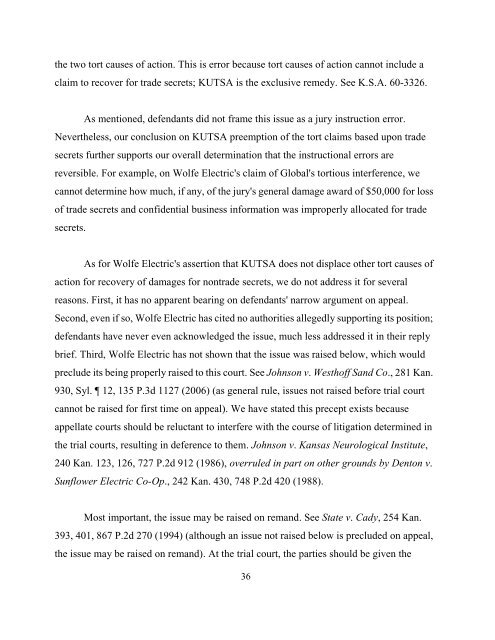Kansas Supreme Court - 99536 â Wolfe Electric, Inc. v. Duckworth
Kansas Supreme Court - 99536 â Wolfe Electric, Inc. v. Duckworth
Kansas Supreme Court - 99536 â Wolfe Electric, Inc. v. Duckworth
You also want an ePaper? Increase the reach of your titles
YUMPU automatically turns print PDFs into web optimized ePapers that Google loves.
the two tort causes of action. This is error because tort causes of action cannot include a<br />
claim to recover for trade secrets; KUTSA is the exclusive remedy. See K.S.A. 60-3326.<br />
As mentioned, defendants did not frame this issue as a jury instruction error.<br />
Nevertheless, our conclusion on KUTSA preemption of the tort claims based upon trade<br />
secrets further supports our overall determination that the instructional errors are<br />
reversible. For example, on <strong>Wolfe</strong> <strong>Electric</strong>'s claim of Global's tortious interference, we<br />
cannot determine how much, if any, of the jury's general damage award of $50,000 for loss<br />
of trade secrets and confidential business information was improperly allocated for trade<br />
secrets.<br />
As for <strong>Wolfe</strong> <strong>Electric</strong>'s assertion that KUTSA does not displace other tort causes of<br />
action for recovery of damages for nontrade secrets, we do not address it for several<br />
reasons. First, it has no apparent bearing on defendants' narrow argument on appeal.<br />
Second, even if so, <strong>Wolfe</strong> <strong>Electric</strong> has cited no authorities allegedly supporting its position;<br />
defendants have never even acknowledged the issue, much less addressed it in their reply<br />
brief. Third, <strong>Wolfe</strong> <strong>Electric</strong> has not shown that the issue was raised below, which would<br />
preclude its being properly raised to this court. See Johnson v. Westhoff Sand Co., 281 Kan.<br />
930, Syl. 12, 135 P.3d 1127 (2006) (as general rule, issues not raised before trial court<br />
cannot be raised for first time on appeal). We have stated this precept exists because<br />
appellate courts should be reluctant to interfere with the course of litigation determined in<br />
the trial courts, resulting in deference to them. Johnson v. <strong>Kansas</strong> Neurological Institute,<br />
240 Kan. 123, 126, 727 P.2d 912 (1986), overruled in part on other grounds by Denton v.<br />
Sunflower <strong>Electric</strong> Co-Op., 242 Kan. 430, 748 P.2d 420 (1988).<br />
Most important, the issue may be raised on remand. See State v. Cady, 254 Kan.<br />
393, 401, 867 P.2d 270 (1994) (although an issue not raised below is precluded on appeal,<br />
the issue may be raised on remand). At the trial court, the parties should be given the<br />
36
















